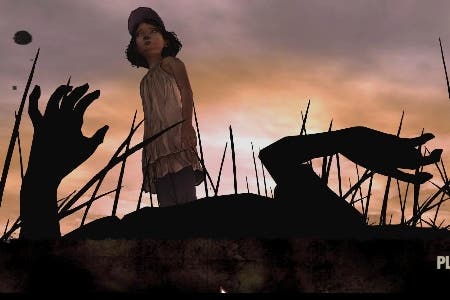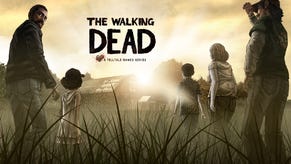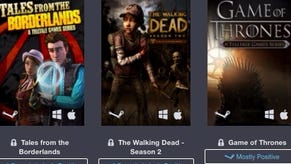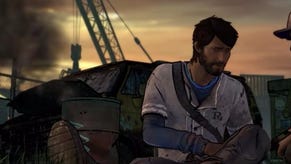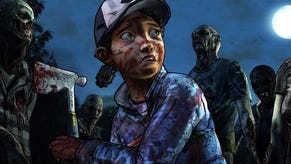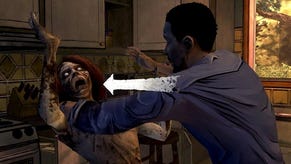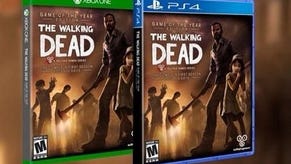The Walking Dead: Season One review
An episodic epidemic: looking back on the full season.
There's a deliberate and sad irony to the title of The Walking Dead. On the surface, it refers to the shambling undead that have overrun the American South (and for all we know, the rest of the world besides); the survivors call them "walkers". But in the unflinching vision of a zombie apocalypse outlined by writer Robert Kirkman and artists Tony Moore and Charlie Adlard in their comic-book series - now adapted for TV as well as into this episodic adventure game by Telltale Games - it also applies to the survivors themselves.
They're alive but not living, ghosts haunting an empty purgatory, delaying the inevitable. They're doomed more by their mistrust of each other than by the zombie threat. Only the very faintest glimmer of hope illuminates this bleak world - a trait it shares with the best post-apocalyptic fiction, from Cormac McCarthy's The Road back to John Wyndham's Day of the Triffids. This also sets it apart from the thematic tidal wave of zombies which has overwhelmed pop culture in the past decade or so, most of it not much more than a grisly backdrop for standard action and adventure.
Perhaps the best thing you can say about Telltale's The Walking Dead - which spins its own yarn, rather than following the comic as the TV show does - is that it never loses sight of this. Sure, you'll click on zombies' heads to stove them in and hammer buttons in desperate quick-time events. But these sequences are about as relevant as the cut-scenes are to most action games. This is never a game about battling zombies. It's about negotiating human relationships when they're strained to breaking point - and making the impossible, horrifying decisions that a survivor has to.
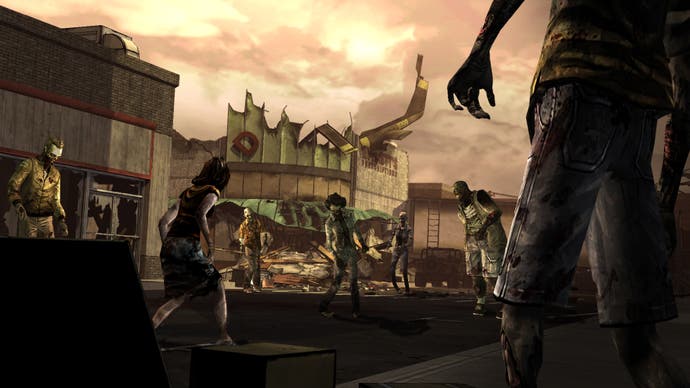
The story isn't inspired, but it's workmanlike - in a good way. The characters are straightforward but credible, their motivations are clearly drawn and their actions ring true. The script isn't especially elegant or insightful or funny, but it works in the service of dramatic situations in the here and now, rather than serving as a vehicle for exposition. The plotting concerns itself with conflict, suspense, mystery and surprise, and hangs its hat on themes of universal human interest. None of this is rocket science and it would make for merely a run-of-the-mill TV show - but in games, it sadly could not be more rare, or welcome.
You play Lee, a teacher convicted of murder, on his way to prison when the apocalypse strikes and he's afforded a chance to escape. He soon takes an 8-year-old girl called Clementine under his wing and they begin a rambling journey across the state of Georgia, searching for safe haven in a world where there is none: on a farm, in a drugstore, at a motel, on the road.
The locations don't matter so much as the map of people they encounter, a shifting group of survivors that's never more than loosely aligned by their need for each other. Kenny, a redneck fisherman, and his family. Lilly, a moody woman of action and her irascible, bigoted father. A naïve, nervy high-school kid called Ben. A homely family of dairy farmers. An enigmatic hobo. A blithe young couple.
Some of these characters are more permanent fixtures than others; it would be a spoiler to indicate who, and in any case, that might change depending on the choices you make as you play. Like so many games these days, The Walking Dead's story promises to change course according to your actions. As usual, this is something of a white lie - but it's a pretty benign one.
"Telltale's refreshing approach is that it's not the consequence that matters - it's the choice itself that's interesting."
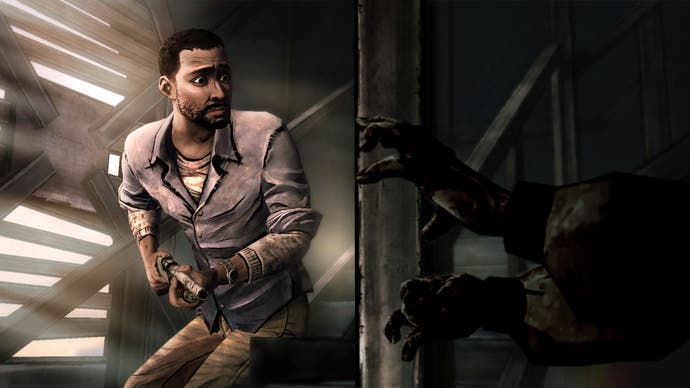
Adventure gamers will be familiar with the format. There's a predominance of dialogue, with conversational choice; action sequences are occasional and heavily scripted; you're often free to explore small locations, solving environmental puzzles or chatting to characters to advance the story. Each episode presents you with a handful of show-stopping choices which seem, initially, to have a profound impact on what follows. Talk to other players or replay the game, however, and you find that in most cases this impact has a surprisingly short half-life, and the story has a habit of finding its way back onto the rails. Like many of its kind before it, The Walking Dead presents an artful and convincing illusion of choice.
Is that a bad thing? I don't think so; it stands to reason that a singular story is a stronger one, and the databases of cause and effect that make up the dynamic storylines in, say, BioWare's games always strike me as a coldly systematic approach to narrative which can only end up undermining its lasting resonance (and which often goes hand-in-hand with a crude, binary morality). Telltale's refreshing approach is that it's not the consequence that matters - it's the choice itself that's interesting.
Time and again, The Walking Dead presents you with truly awful decisions to make, often under time pressure, always under narrative pressure and - crucially - with the eyes of your fellow survivors on you. It might be something simple like who to save from certain death. Often it's a decision between pragmatism and ideals - do you kill an infected character before they die, or wait until they breathe their last breath? At other times it's a question of loyalty, or honesty, or simply picking between the frying pan and the fire.
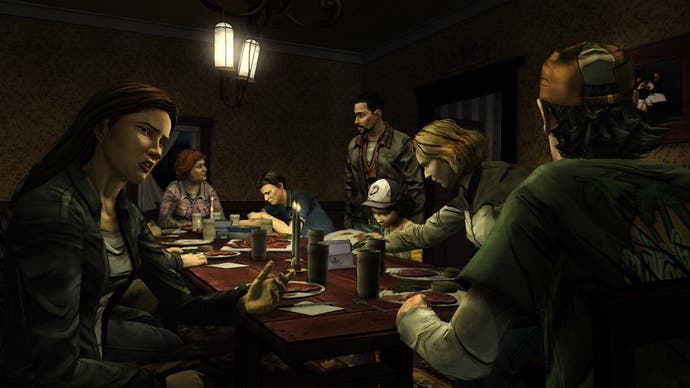
These big choices are nestled in a bed of hundreds of smaller ones as you pick your way through conversations, with your replies often influencing how characters feel about you and talk to you. Again, the effect on events is minimal - but the effect on your state of mind is more significant. By making your choices constant and pervasive, and by putting your hands on the rapidly unravelling strings of a cat's cradle of human relationships, The Walking Dead more effectively puts you in the boots of a survivor than any action game - even the grimly effective I Am Alive.
It's a shame, though, that the game has a habit of dropping or half-realising many of its more interesting ideas. The ambiguity of Lee's back-story is fascinatingly explored in the first episode as you pick your way through questioning, trying to form an image of Lee in other people's eyes as well as your own. (Incidentally, it should not be cause for celebration that a game has a lead character who is both recognisably a human being and a black man, but unfortunately it is.) But this thread is dropped - and then ham-fistedly resurrected before being just as awkwardly dropped again.
The churn of the cast takes its toll, too. It's understandable that Telltale wants survivors to come and go from the group, for the setting to be plausible as well as for dramatic effect. But over the game's five episodes and dozen or so hours, it's too often the case that an interesting dynamic is abruptly defused by happenstance. With a more stable core to its cast and less uneven pacing - the second episode is a well-constructed standout, while the others tend to lurch and meander - the game could have explored its humane themes even more effectively.
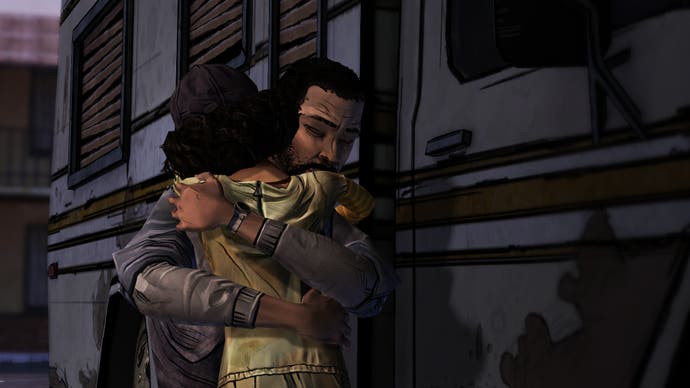
That The Walking Dead hangs together as well as it does is down to two factors. The first, paradoxically, is the episodic structure. At around two to three hours, the episodes have perfect length and balance. This way, the game's more prosaic elements - the uninspiring puzzles, the languid searches for things to interact with, the hackneyed quick-time events - don't hang around long enough to get on your nerves, while the story only benefits from the sense of the passage of time and of living with the characters. Even if you pick up a season pass now, it would be a good idea to take your time and play episodes in isolation rather than greedily consume the whole thing.
The other factor is the game's heart: the relationship between Lee and Clementine. Giving us a kid to protect is a simple tactic to gain our emotional investment, but that doesn't make it a cynical one. It's plain and heartfelt, and played for horror or melancholy or awkwardness as often as it is for sentimental relief. In truth, these two characters and their relationship rarely extend beyond two dimensions (and Clementine's voice actress doesn't quite sell the part), but in this context it doesn't matter. Certainly not by the final episode, and a concluding scene of rare sensitivity and tremendous power. This moment is sure to move the most hard-hearted player - and it dignifies the entire series.
The Walking Dead is a serious, solid, but clay-footed work; in truth, it wouldn't stand out from the crowd if video game storytelling wasn't so impoverished to begin with. But some of the best pop fiction comes not from geniuses but from craftsmen who are given the right subject matter and understand just how to treat it, and that's true of Telltale here. We can only hope that the warm reception it's had from gamers will help to refocus the curious genre of interactive drama - always so ambitious, yet so easily distracted by expensive high-concept gimmickry in games like Heavy Rain and LA Noire. Those games worked in their own ways, but Telltale has succeeded much more simply: by writing a good story about people, and putting that story first.
